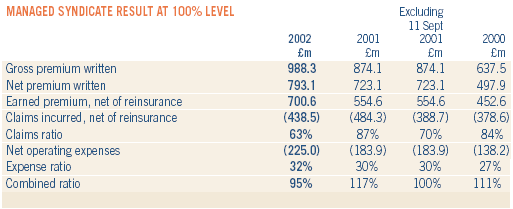


|
Strategically, Amlin has substantially
strengthened its position during 2002.
Our stature in the market has helped
a strong showing of new business. 2002 was a watershed year for Amlin. The work of the past three years to deliver strong performance has started to be recognised in our financial results. In 2001, the benefits were beginning to come through but we were thwarted by the enormity of the 11 September terrorist atrocities. Amlin’s strategy, combined with its stronger market position, exceptional underwriting skills, and the commitment of the management team, places us in an excellent position to thrive in current conditions. Moreover, our strategy is designed to deliver sustained out-performance going forward. Our profit before tax for the year was £55.4 million (2001 loss: £81.5 million) and, after tax, resulted in earnings per share of 14.1p (2001 loss: 33.3p). A truer comparison of our underlying trading performance is provided by excluding the effect of the 11 September terrorist attacks from the 2001 result – the 2001 loss before tax on this basis was £17.6 million and the loss per share was 8.7p. The improved result came from both our underwriting and asset management disciplines. Underwriting performance was significantly improved with the overall combined ratio 5 points better than in 2001 (excluding the 11 September losses) at 95%. Investment returns exceeded our long term assumed rate of return with an average of 7.5% being earned on our bond portfolio. Our decision to divest our equity portfolio in September 2001 also had a material impact on the improved performance. With the underlying profitability of the business starting to be recognised, we resumed the payment of dividends with our interim results. The Company has pursued a policy of leveraging the balance sheet in good market conditions, so as to enhance future returns on equity, and this means that the Company needs to retain capital to support the leveraged underwriting position. Additionally, free cash flow from current profitable underwriting is restricted by Lloyd’s three year settlement system. Taking this into account, the Board is proposing a final dividend of 1.25p per share, which together with the interim dividend of 0.75p per share brings the total dividend for 2002 to 2.0p per share (2001: nil). Strategically, Amlin has substantially strengthened its position during 2002. Our offer to acquire the third party capacity, which was successfully completed, secured 100% ownership of our syndicate from 2004 and provides us with the flexibility, going forward, to manage our business to build shareholder value without the ongoing complications of having to account to third parties on an annual joint-venture basis. Amlin’s position in the London market has continued to strengthen. With a 7% share of Lloyd’s capacity, we are now the largest independent underwriting business in Lloyd’s. Our stature in the market has helped a strong showing of new business, allowing our underwriting teams to maintain a good level of risk selection aimed at continually improving the overall quality of our underwriting book. Lloyd’s has come through the traumas of the last eighteen months with its security rating maintained at the ‘A-’ level that is so important for a large proportion of our business. Compared with a year ago, we consider Lloyd’s position in the global non-life market to be materially improved. Lloyd’s Chairman’s Strategy Group proposals, which were approved at Lloyd’s Extraordinary General Meeting in September last year, should contribute to a far healthier market in the medium to longer term. It is important to Amlin that Lloyd’s follows through with its intentions, so that the risk is minimised of Amlin subsidising poorly managed businesses through market levies. 
To grow our dedicated capacity from £400 million in 2001 to £862 million in 2003 has required significant financial support, especially in the aftermath of 11 September. We are grateful to our shareholders, to State Farm and to our bankers, for demonstrating the confidence in our business to enable this material growth into an exceptionally good underwriting climate. The outlook for attractive returns on equity remains good notwithstanding an expectation that rates will peak in 2003. We expect several years of good, profitable underwriting before competitive forces reduce margins to less acceptable levels. In as much as we have spent the last three years positioning Amlin for the current climate, we are now turning our attentions to ensuring that we are positioned to manage the down cycle when it arrives. Finally, I would like, on behalf of the Board, to congratulate the executive team and all our employees on achieving the 2002 result and on working diligently to attain the position we now hold in the market. 
ROGER TAYLOR CHAIRMAN |
||